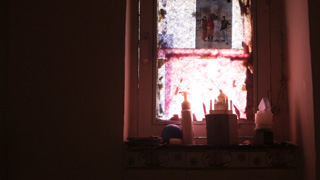I Am Yet to See Delhi
 BANGLADESH, INDIA / 2014 / Hindi, Bengali / Color, B&W / Blu-ray / 19 min
BANGLADESH, INDIA / 2014 / Hindi, Bengali / Color, B&W / Blu-ray / 19 min
Director, Photography, Editing, Narration: Humaira Bilkis
Sound: Satendra Singh, Shagun Belwal, Radhika Fatania
Source: Humaira Bilkis
Moving alone to Delhi to study film, “I” loses herself in the city, her camera becoming a part of her. Listening to the breath of the people who inhabit this place—its roads, markets, mosques and tourist spots—and following where her gaze takes her, she picks up casual conversations and the general buzz, beginning to hear the timbre of the city. Sinking deeply into the world that is “I,” she spells out the quavering movements of her outsider feelings. A personal journey inscribing Delhi’s pulse.
[Director’s Statement] I Am Yet to See Delhi is a film about an outsider in the city. She visits Delhi for a year to study filmmaking. Apart from her class work, her lonely existence forces her to encounter questions on identity and self on a register of time that is both contemporary and historical. She roams the streets of the city alone. She takes recourse to tourism—an institutional arrangement, through which she gets a glimpse of the city’s architecture, museum and mausoleums. A fresh addition to this list is ultra-modern shopping malls. She conducts herself like a passive passenger unable to interact with the normative modes of representing history, until she re-focuses her contemplation on the tourists and their desire to see. She realises that the mobile camera has become a tool for consumptive gaze for the tourists. The audience sees her seeing the tourists staring at history. The act of seeing assumes the role of meta-narrative.
Her repeated forays into the cross sections of the city make her hyper-conscious about her name and its obvious Islamic connotation. She finds herself subsumed by her religious identity, which like a template sits on her, with or without her consent.
It is the people, bound together in a relationship of exchange, that weave the cultural fabric of a society. Life becomes an accumulation of numerous lived moments which exceed representation and its politics. The filmmaker strives to represent a secular time through the contemplation of a ceaseless and untiring flow of events in front of her camera and microphone. She refuses to look at Delhi through the eyes of a tourist. The mausoleums and architecture recede to the background as she reconstructs a city through all its dilemmas, in light and shade.
 Humaira Bilkis
Humaira Bilkis
Humaira Bilkis is a Dhaka-based independent filmmaker. Her interest in filmmaking revolves around the creative treatment of actuality. She uses her subjective view to explore a context, as she believes in multiple realities. Since completing her degree in Mass Communication, she has been a filmmaker for the last five years. She received her post graduate diploma in Creative Documentary at the Sri Aurobindo Center for Arts and Communication, Delhi. During her time there she made some films, which were very anthropocentric and self-reflexive. Her films have been screened in several film festivals around India. In addition, Humaira has also worked as an associate producer on several international documentaries. Now she is making a short-length non-fiction work on homosexual people in Bangladesh. In addition, she has been awarded funds for a feature-length documentary on the access to education of tea laborers of Bangladesh.
